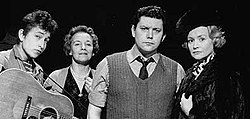Production
Madhouse on Castle Street was commissioned as part of the Sunday Night Play strand which had been running on BBC Television since 1960. The play was written by Evan Jones, who would go on to write the screenplays for films such as Modesty Blaise and Funeral in Berlin , [2] and directed by Philip Saville. Saville had seen Bob Dylan performing in New York City in 1962, and in December that year he contracted Dylan to come to London for three weeks to star in Madhouse on Castle Street, in spite of Dylan's complete lack of acting training or experience. This was the performer's first trip outside of North America. Dylan was originally supposed to have played the leading role in the play, but during rehearsals it became apparent that he lacked the ability to learn lines – stating that he would rather "express himself in song" – was lax in his time keeping, and would often wander off to smoke cannabis. [3]
Saville was still keen to include Dylan, so – together with Jones – re-structured the play to create two characters out of the original one that Dylan had been hired to perform. Actor David Warner was hired to play the main acting role of Lennie, while Dylan performed songs commenting on the action in the manner of a Greek chorus as the new character Bobby, essentially playing himself. At the conclusion of the play, Dylan performed "Blowin' in the Wind", one of the first major public performances of the song. The play was planned to be recorded in one session on 30 December 1962, but it overran and the Technical Operating Manager told cast and crew to go home, even though they were willing to complete the filming. London was in the grip of a major blizzard and it was not possible to arrange a further session until 4 January 1963, when the play was completed, and it was transmitted on 13 January 1963. [4] [5]
Junking
As was the usual method of BBC television drama production at the time, the play was produced in a multi-camera electronic studio on video cameras, although it was recorded as a 35 mm film telerecording rather than on videotape. This 35mm master was released for junking in 1968, and no copy of the play is known to exist.
Still photographs and scripts for the production survive, as do some amateur off-air reel-to-reel audio tape recordings of four of Dylan's songs. [7] In 2005 the BBC launched a search for a video recording of the play, uncovering some audio recordings of the songs, but it seems that a full off-air audio copy does not exist. [4] [8] In April 2007, BBC Four broadcast a documentary about the making of the play in the Arena strand, featuring interviews with Saville, Jones, Martin Carthy, Peggy Seeger, Dylan collector Ian Woodward, and the first re-broadcast of the songs from the play. [1] In November 2008, BBC Radio 2 broadcast a documentary, narrated by Bob Harris, about Dylan's visit to London and the making of the play. [9]

Live Aid was a multi-venue benefit concert held on Saturday 13 July 1985, as well as a music-based fundraising initiative. The original event was organised by Bob Geldof and Midge Ure to raise further funds for relief of the 1983–1985 famine in Ethiopia, a movement that started with the release of the successful charity single "Do They Know It's Christmas?" in December 1984. Billed as the "global jukebox", Live Aid was held simultaneously at Wembley Stadium in London, attended by about 72,000 people, and John F. Kennedy Stadium in Philadelphia, attended by 89,484 people.
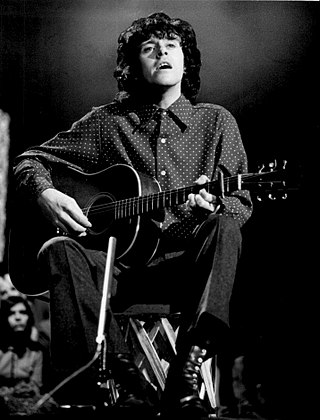
Donovan Phillips Leitch, known mononymously as Donovan, is a Scottish musician, songwriter, and record producer. He developed an eclectic and distinctive style that blended folk, jazz, pop, psychedelic rock and world music. He has lived in Scotland, Hertfordshire (England), London, California, and—since at least 2008—in County Cork, Ireland, with his family. Emerging from the British folk scene, Donovan reached fame in the United Kingdom in early 1965 with live performances on the pop TV series Ready Steady Go!.
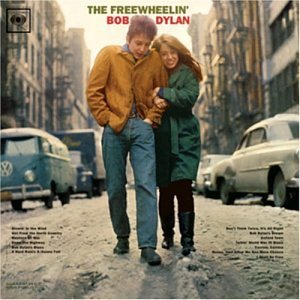
The Freewheelin' Bob Dylan is the second studio album by American singer-songwriter Bob Dylan, released on May 27, 1963 by Columbia Records. Whereas his self-titled debut album Bob Dylan had contained only two original songs, this album represented the beginning of Dylan's writing contemporary words to traditional melodies. Eleven of the thirteen songs on the album are Dylan's original compositions. It opens with "Blowin' in the Wind", which became an anthem of the 1960s, and an international hit for folk trio Peter, Paul and Mary soon after the release of the album. The album featured several other songs which came to be regarded as among Dylan's best compositions and classics of the 1960s folk scene: "Girl from the North Country", "Masters of War", "A Hard Rain's a-Gonna Fall" and "Don't Think Twice, It's All Right".

"Blowin' in the Wind" is a song written by Bob Dylan in 1962. It was released as a single and included on his album The Freewheelin' Bob Dylan in 1963. It has been described as a protest song and poses a series of rhetorical questions about peace, war, and freedom. The refrain "The answer, my friend, is blowin' in the wind" has been described as "impenetrably ambiguous: either the answer is so obvious it is right in your face, or the answer is as intangible as the wind".
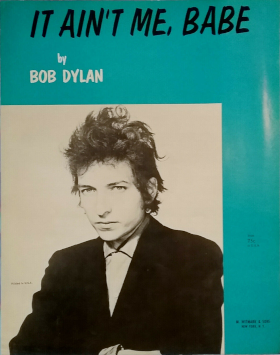
"It Ain't Me Babe" is a song by Bob Dylan that originally appeared on his fourth album Another Side of Bob Dylan, which was released in 1964 by Columbia Records. According to music critic Oliver Trager, this song, along with others on the album, marked a departure for Dylan as he began to explore the possibilities of language and deeper levels of the human experience. Within a year of its release, the song was picked up as a single by folk rock act the Turtles and country artist Johnny Cash.

Cerys Matthews is a Welsh singer, songwriter, author, and broadcaster. She was a founding member of Welsh rock band Catatonia and a leading figure in the "Cool Cymru" movement of the late 1990s.

The Bootleg Series Vol. 5: Bob Dylan Live 1975, The Rolling Thunder Revue is a live album by Bob Dylan released by Columbia Records in 2002. The third installment in the ongoing Bob Dylan Bootleg Series on Legacy Records, it documents the Rolling Thunder Revue led by Dylan prior to the release of the album Desire. Until the release of this album, the only official live documentation of the Rolling Thunder Revue was Hard Rain, recorded during the less critically well received second leg of the tour.
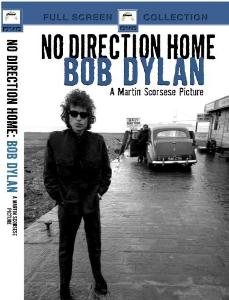
No Direction Home: Bob Dylan is a 2005 documentary film by Martin Scorsese that traces the life of Bob Dylan, and his impact on 20th-century American popular music and culture. The film focuses on the period between Dylan's arrival in New York in January 1961 and his "retirement" from touring following his motorcycle accident in July 1966. This period encapsulates Dylan's rise to fame as a folk singer and songwriter where he became the center of a cultural and musical upheaval, and continues through the electric controversy surrounding his move to a rock style of music.
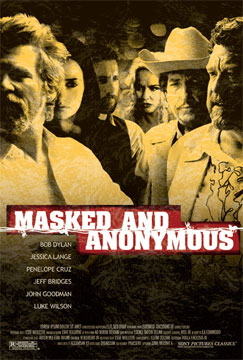
Masked and Anonymous is a 2003 drama film directed by Larry Charles. The film was written by Larry Charles and Bob Dylan, the latter under the pseudonym "Sergei Petrov". It stars Dylan alongside a star-heavy cast, including John Goodman, Jeff Bridges, Penélope Cruz, Val Kilmer, Mickey Rourke, Jessica Lange, Luke Wilson, Angela Bassett, Bruce Dern, Cheech Marin, Ed Harris, Chris Penn, Steven Bauer, Giovanni Ribisi, Michael Paul Chan, Christian Slater, and Fred Ward.
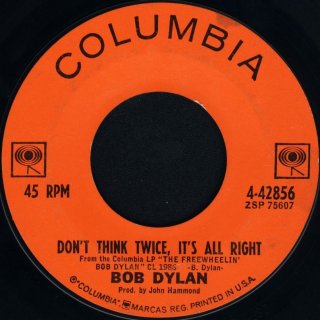
"Don't Think Twice, It's All Right" is a song written by Bob Dylan in 1962, recorded on November 14 that year, and released on the 1963 album The Freewheelin' Bob Dylan and as the b-side of the Blowin' in the Wind single. The song was covered by several other artists, including Peter, Paul and Mary who released it as a single which reached the Top 10 of the Billboard Hot 100.

Philip Saville was a British director, screenwriter and former actor whose career lasted half a century. The British Film Institute's Screenonline website described Saville as "one of Britain's most prolific and pioneering television and film directors". His work included 45 contributions to Armchair Theatre (1956–1972) and he won two Best Drama Series BAFTAs for Boys from the Blackstuff (1982) and The Life and Loves of a She-Devil (1986).
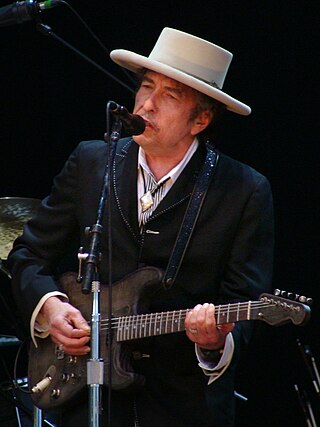
Bob Dylan is an American singer and songwriter. Often regarded as one of the greatest songwriters of all time, he has been a major figure in popular culture during a career spanning more than 60 years. Much of his most celebrated work dates from the 1960s, when songs such as "Blowin' in the Wind" (1963) and "The Times They Are a-Changin'" (1964) became anthems for the civil rights and antiwar movements. His lyrics during this period incorporated a range of political, social, philosophical, and literary influences, defying pop music conventions and appealing to the burgeoning counterculture.
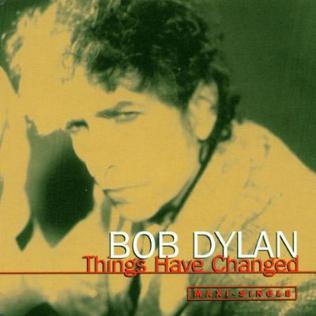
"Things Have Changed" is a song from the film Wonder Boys, written and performed by Bob Dylan and released as a single on May 1, 2000, that won both the Academy Award for Best Original Song and the Golden Globe Award for Best Original Song. It was also anthologized on the compilation albums The Essential Bob Dylan in 2000, The Best of Bob Dylan in 2005 and Dylan in 2007.
The Other Side of the Mirror: Bob Dylan at the Newport Folk Festival is a 2007 documentary film about Bob Dylan's appearances at the Newport Folk Festival in three successive years: 1963, 1964, and 1965, directed by Murray Lerner.
This is a list of British television related events from 1963.

Evan Jones is a Jamaican poet, playwright and screenwriter based in Britain. He was educated in Jamaica, the United States and England. Jones taught at schools in the United States before moving to England in 1956 and beginning a career as a writer.

The Concert for Bangladesh is a film directed by Saul Swimmer and released in 1972. The film documents the two benefit concerts that were organised by George Harrison and Ravi Shankar to raise funds for refugees of the Bangladesh Liberation War, and were held on Sunday, 1 August 1971 at Madison Square Garden in New York City. As well as notable performances from Harrison and Shankar, the film includes "main performer" contributions from Harrison's fellow ex-Beatle Ringo Starr, Billy Preston and Leon Russell, and a surprise walk-on from Bob Dylan. Other contributing musicians include Ali Akbar Khan, Eric Clapton, the band Badfinger, Klaus Voormann, Jesse Ed Davis, Jim Horn and Jim Keltner.
BBC Sunday-Night Play is the anthology drama series which replaced Sunday Night Theatre in 1960. It was broadcast on what was then BBC Television.
The Never Ending Tour is the popular name for Bob Dylan's endless touring schedule since June 7, 1988.
"When He Returns" is a gospel song written and performed by the American singer-songwriter Bob Dylan and released as the ninth and final track on his 1979 album Slow Train Coming. The title and content of the song explicitly reference the Second Coming of Jesus. In contrast to the bigger band arrangements on the album's other eight tracks, Dylan's vocal on "When He Returns" is accompanied only by Barry Beckett on piano. The song was recorded at Muscle Shoals Sound Studio in Sheffield, Alabama and produced by Jerry Wexler.
